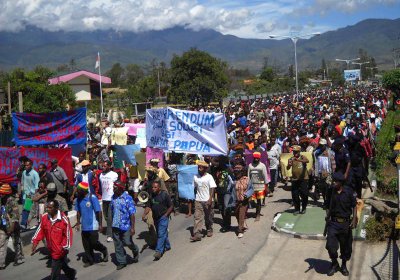“It is not just posturing towards Iran, the US has massively increased its presence in Latin America”, Nelson Davila, Venezuelan ambassador to Australia told a July 14 forum. The gathering was part of the “Underground Talk” series at the New International Bookshop at Melbourne Trades Hall.
Democracy
On August 7, Alvaro Uribe will complete his reign as president of Colombia — eight years of spectacular government criminality and corruption, even by Colombian standards. A brief review of just his second term illustrates this.
The Washington Post reported on November 18, 2006 that the Uribe administration was in crisis. Investigations revealed that members of Congress collaborated with right-wing death squads to fix elections and assassinate opponents. That was the tip of the iceberg.
The judge entrusted by Colombia’s Constitutional Court to investigate the legality of an agreement to hand over seven military bases to the US military has deemed the pact unconstitutional because it was not approved by Congress.
The report was handed down by Judge Jorge Ivan Palacio on July 23, a day after Colombia unleashed its slanderous attacks that Venezuela was “harbouring narco-terrorists”.
Palacio’s report on the agreement will be reviewed by the nine-judge panel of the Constitutional Court, which has to deliver a ruling by August 17.
On July 12, six months to the day after January's earthquake, the Haitian government held a ceremony behind the crumbled National Palace.
Before assembled dignitaries from embassies, NGOs, and Haiti’s elite, President Rene Preval and Prime Minister Jean-Max Bellerive draped medals of honor on prominent figures ranging from CNN celebrity journalist Anderson Cooper and Hollywood actor Sean Penn to retired Colonel Himmler Rebu and retired General Herard Abraham, officers who have enforced dictatorships and participated in coups over the past 30 years.
El Salvador is a country where supermarket prices are comparable to those in developed countries, yet a sugar cane cutter earns $5 a day.
This small, predominantly rural, yet densely populated country has a violent history of colonial oppression and the attempted genocide of the indigenous people. More recently, it went through the 1980-92 civil war.
“La Lucha” is a phrase you hear a lot in El Salvador. It means “the struggle”.
Recent moves by the Venezuelan government, which now claims almost 50% of the shares in a pro-coup TV station and revoked the concession of another, represent new steps towards reclaim the media for the people.
The moves came as US-Venezuelan writer Eva Golinger revealed on July 15 in a Chavezcode.com post that recently declassified documents showed the US State Department has funded opposition media to the tune of more than US$4 million.
On June 28 last year, democratically-elected Honduran President Manuel Zelaya was overthrown in a US-backed military coup.
Zelaya had upset US and Honduran corporate interests with policies such as blocking privatisation, increasing the minimum wage and joining the anti-imperialist Latin American bloc led by Venezuela and Cuba, the Bolivarian Alliance for the Americas (ALBA).
But it was Zelaya’s decision to grant a demand of the social movements and begin a democratic process towards rewriting Honduras’s pro-elite constitution that led directly to the coup.
Alarm bells should be ringing as the threat of war looms on the horizon, Venezuelan President Hugo Chavez warned in his July 18 weekly column.
The warning came after tensions again flared with neighbouring Colombia, and the Central American nation of Costa Rica agreed to 6000 US troops being deployed on its soil.
Chavez placed Venezuela on high alert and broke diplomatic relations with Colombia after a July 22 meeting of the Organisation of American States (OAS).
A unprecedented mass demonstration took place on July 8 in Jayapura, the capital of Indonesian-occupied West Papua, Straighttimes.com said that day.
Thousands of people joined a long march, walking 17 kilometres from the Papua People’s Assembly (MRP) to the Papuan Provincial Legislature (DPRP) to reject the “special autonomy” granted by Indonesia in 2001. Protesters demanded a referendum on West Papuan independence and an internationally-mediated dialogue with Jakarta.
Germany’s Federal Administrative Court ruled on July 21 that the Verfassungsschutz — Germany’s domestic spy agency — had a right to spy on the left-wing party Die Linke.
Bodo Ramelow, Die Linke’s leader in the eastern state of Thuringia and others were appealing against the agency spying on them. The justification for the spying are claims Die Linke contained “anti-constitutional” elements because of its origins in the former East German state.
Ewan Saunders, Socialist Alliance candidate for Brisbane, recently returned from the Justice Ride to Alice Springs.
* * *
On July 14, after almost 50 hours spent on the road over four days, I, along with about 20 others, rolled back into Brisbane at 11.30pm.
The trip back from Alice Springs was the last leg of a two-week Justice Ride that changed the lives of a busload of people, many of whom hadn’t considered themselves “activists” before the bus left on July 1.
From June 30 to July 20, a group of Aboriginal rights and environment activists from New South Wales used a decommissioned red school bus to travel to Alice Springs.
The purpose was to expose government and media silence over the appalling conditions and treatment of Aboriginal people living under the NT intervention.
The passengers attended the Defending Indigenous Rights convergence in Alice Springs. They also visited town camps and remote communities to witness the effects of the intervention’s discriminatory measures such as income quarantining and compulsory land leases.
- Previous page
- Page 517
- Next page









